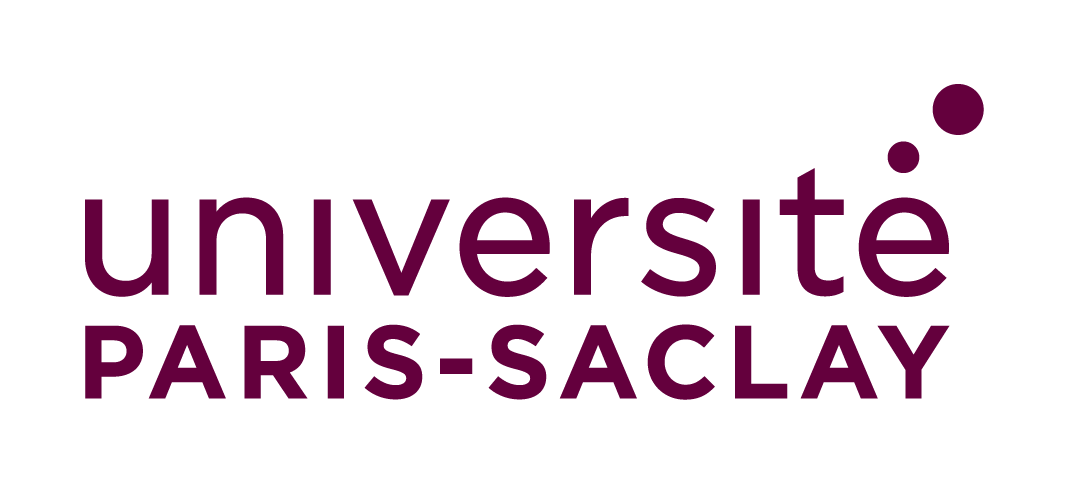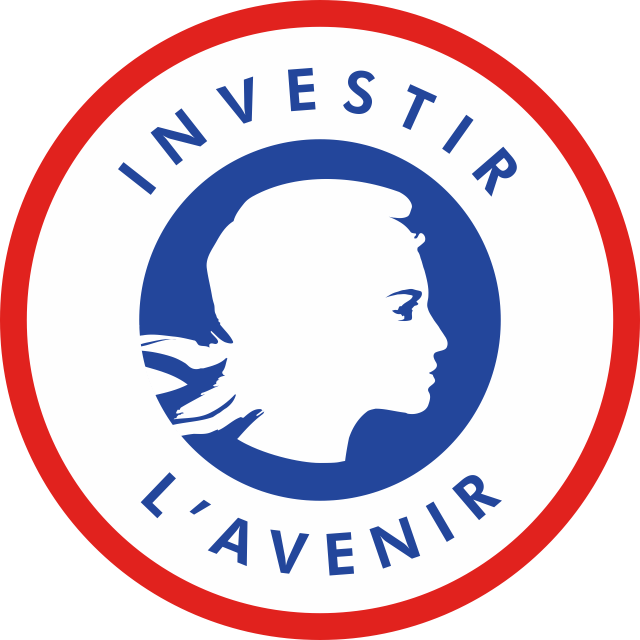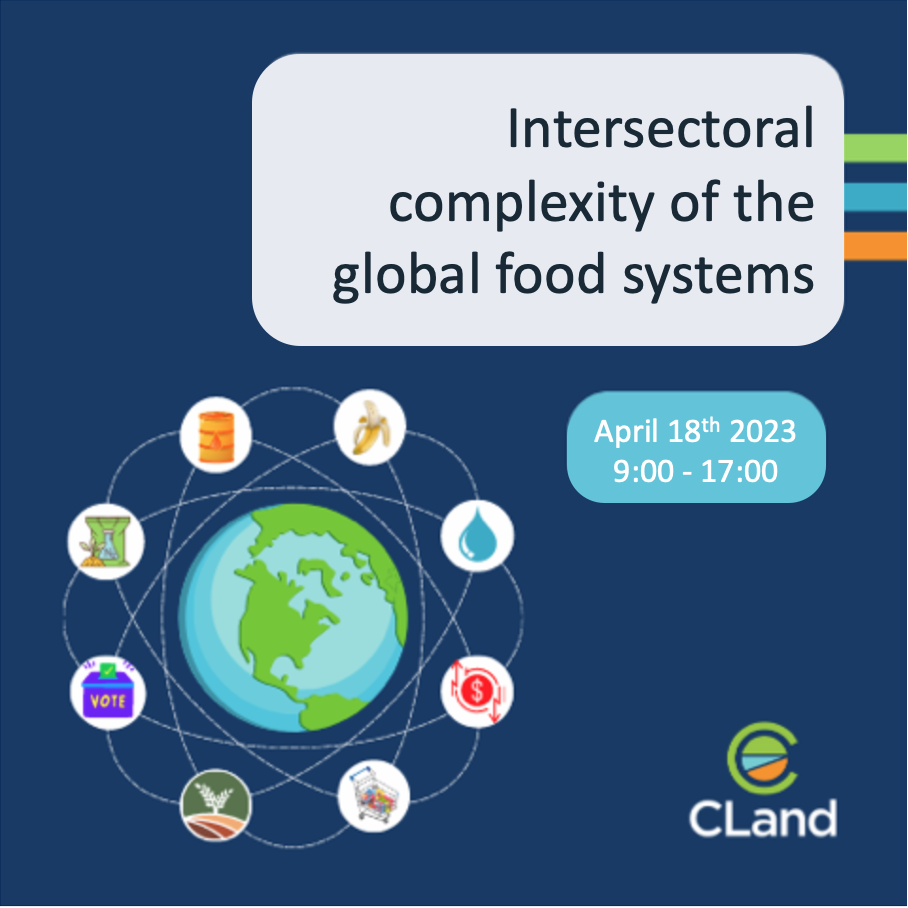
The CLand team is thrilled to announce that it will organize an international seminar on "Intersectoral complexity of the global food system". This seminar will gather six renowned researchers and will be chaired by members of the project's executive committee. It will take place on April 18, 2023, and will be held at the AgroParisTech/INRAE Campus, 22 place de l'Agronomie, in Palaiseau (Room : Pal-A-1-amp).
Attendance is free, but registration is mandatory! See the registration form below.
Lunch will be provided on-site.
Seminar abstract and speakers
Driven by multiple factors, most importantly the increasing food demand, agro-food systems became more and more globalized. During the end of the last millennium, pushed by neoliberal economic policies, international trade in food commodities saw a marked acceleration, so that it is possible to speak about a “trade revolution”. Agro-food systems became more and more globally interconnected and interdependent in a complex way. First, such a complexity is manifested in tele-coupled effects, in which consequences of actions in a region can occur in other parts of the world. Second, this complexity involves a wide diversity of stakeholders and multiple sectors, as the dynamics of food production cannot be separated by the dynamics of several resources (e.g., water, energy, nutrients) and involves socio-economic and policy systems.
On the one hand, the global interconnectedness of agro-food systems improved food security in several parts of the world; on the other hand, this could lead to unintended consequences and unsustainable dynamics. This is why it is important to understand the complex trade-offs involved. Understanding such trade-offs and identifying levers for improvements mandatorily requires an interdisciplinary approach, in which multiple points of view are considered from different sectors.
The purpose of this seminar is to provide food for thought, giving an overview about different points of view on the global agro-food systems, involving different sectors and disciplines. By means of six invited speakers, the following themes will be explored: water-food nexus and human health (Maria Cristina Rulli), water grabbing (Davide Danilo Chiarelli), trade-offs related to water security, vulnerability, and iniquities (Paolo D’Odorico), global nitrogen fluxes (Gilles Billen), food losses and waste (Barbara Redlingshöfer), policy aspects (Eve Fouilleux). The presentations will show the complexity and the trade-offs related to the global agro-food systems from different perspectives. At the end of the seminar a final roundtable will explore specific questions regarding possible levers for agro-food systems sustainability.
Agenda
9.00 - Welcome coffee
9.30 - Introduction
9.40 - Maria Cristina Rulli - Connecting the dots between the water-food nexus and human health
10.20 - Paolo D’Odorico - Global water security: Tradeoffs, vulnerabilities, and inequities
11.00 Break
11.20 - Davide Danilo Chiarelli - Water competition arose by the agrarian transition in the Global South
12.00 - Barbara Redlingshöfer - Reducing food loss and waste in the global food system: trade-offs and policies
12.40 - Lunch break
14.00 - Gilles Billen - Globalization and regional specialization of agro-food systems: a biogeochemical perspective based on the analysis of N fluxes
14.40 - Eve Feuilleux - Policies and politics of globalisation of food systems
15.20 - Break
15.40 - Round Table
16.40 - Wrap-up
17.00 - End of the seminar
Lunch will be served on site.
To attend this event, please register using the registration form below.
Our speakers
 |
Dr. Maria Cristina Rulli is Full Professor of Hydrology and Water and Food Security at the Politecnico di Milano and she is deputy president of the Italian Society of Water Engineering since 2021. Her research focus on the interaction between hydrological processes and humanity. Using the Food-Energy-Water (FEW) nexus perspective, she has been investigating the impacts on food and water security induced by global changes. She has focused on the emergent phenomenon of Large Scale Land Acquisition (LSLA) and its implication on water, energy and food security, as well as on water governance, rural livelihoods, and the emergence of water conflicts. Her most recent research concentrates on the nexus between Health and Environment focusing on the potential nexus between the unsustainable food system and the insurgence of diseases (e.g., zoonotic, food related, uncommunicable). |
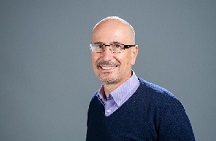 |
Paolo D’Odorico is the Thomas J. Graff Professor of Natural Resources at the University of California, Berkeley. His research focuses on the role of hydrological processes in the functioning of terrestrial ecosystems and societies. Starting from analyses of mechanisms underlying the coupling between hydrological processes and the biota, his research has contributed to research in ecohydrology. Through field observations and modeling studies he is studying new hydrological, ecological, and aeolian mechanisms of desertification and factors contributing to the resilience of the desert margins. His work has highlighted the effect of environmental variability and positive feedback between vegetation and resource availability on the resilience of savannas, dry tropical forests, freshwater wetlands, mangrove swamps, and seagrass meadows. He investigates the global patterns of water use in agriculture, sustainable irrigation, virtual water trade, and transnational water appropriations and their impacts on water equity, food security, and the environment. |
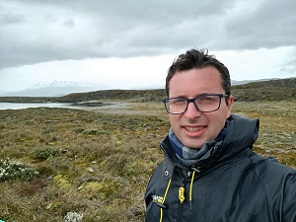 |
Davide Danilo Chiarelli obtained a MSc degree in Civil Engineering in 2013. At the moment he is a researcher at the DICA department of Politecnico di Milano, where he completed his PhD in July 2018 with a research based on Water and Food Security titled “The Water-Land-Food Nexus”. The main topics he is analyzing include the following: sustainability in the use of natural resources (i.e. water and fertile soil); hydrological effects of land use changes and deforestation, and its related consequences as land erosion and mass movements; crop water demand under present conditions and under climate change scenarios. He strongly believes in the importance of preserving our planet and its (its, not ours!) limited resources and how to achieve this goal it is necessary to start from a good knowledge of the problem and to educate future generations. |
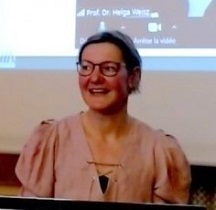 |
Barbara Redlingshöfer is a social ecologist in the Sadapt research unit at INRAE. She has a background in nutrition and home economics (Dipl. Oec. Troph., Justus-Liebig-University Giessen) and a PhD in cultural studies (Dr. phil., Humboldt University Berlin). Her research, which is interdisciplinary in nature, focuses on the socially organised production, distribution, use and final disposal to the environment of food and food-related materials, the so-called social food metabolism. Accounting and analysis of different aspects of social (non-)use of food in different regional (e.g. national, urban) and sectoral settings (e.g. agricultural production, social catering) are among her main research areas, operationalised by quantitative and qualitative methods (material flow analysis, surveys, observations, etc.). Co-author of a UNEP report on consumer food waste, she is also an expert on French food waste policy. |
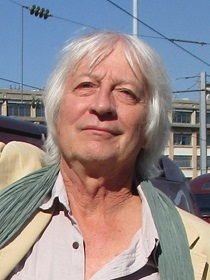 |
Gilles Billen got his PhD at the Free University of Brussels in 1976, where he later headed the Group of Aquatic Environmental Microbiology for 15 years. He was mostly active in studying microbial processes in estuarine and marine areas, in connection with the cycles of carbon and nutrients. In 1997, he moved to |
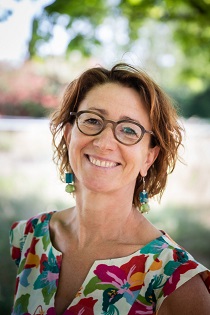 |
Eve Fouilleux is a Senior Research Director at the French National Center for Scientific Research (CNRS), Laboratoire Interdisciplinaire Sciences Innovations Sociétés (LISIS), University of Paris-Est Marne-la-Vallée, and an Associated researcher at the Center for International Research for Agriculture for Development (Cirad), UMR MoISA, Montpellier Interdisciplinary research Center on Sustainable Afrifood systems. She is a political scientist working on global and multilevel policies and politics in the field of food, agriculture and natural resources. She works on public policies and policy-making, through a political sociology perspective, with a special focus on the role of ideas in policy changes in a multilevel governance context. One of her main research question regards how globalisation reshapes the conditions and dynamics of public policy debates. She has published extensively on the European common agricultural policy, on food security policies in Africa, on organic agriculture policies and regulations in France and the EU, on global policies (food security, biodiversity, sustainability voluntary standards, bioeconomy). For some years, her empirical research is mainly focused on organic farming and agroecology policies. She is scientific co-coordinator of a research action project on institutional innovations for organic agriculture in Tanzania, Uganda and Morocco. |

